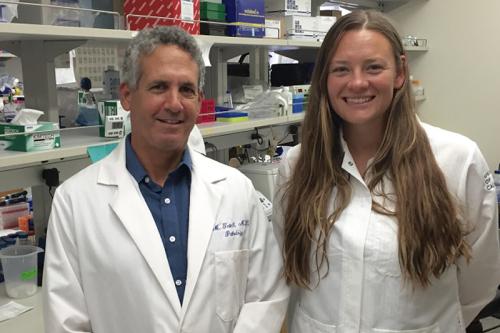
Tara TeSlaa, Ph.D.
- Assistant Professor, Molecular and Medical Pharmacology

Tara TeSlaa, Ph.D., studies the metabolic shifts that occur during disease development and how metabolism can drive changes in cell identity and function. Her research could lead to new therapies for metabolic diseases like Type 2 diabetes and improve methods to produce mature stem cells for regenerative medicine.
TeSlaa’s research is divided into two areas of focus: using in vivo stable isotope tracing to measure metabolic flux on the organismal, tissue and cellular level; and manipulating metabolism using genetics, diet, exercise and disease models to understand the mechanisms linking metabolism to cellular fate, function and health.
She has a particular interest in metabolic diseases including Type 2 diabetes and metabolic-associated steatohepatitis. In the latter, also known as non-alcoholic fatty liver disease, accumulation of fat in the liver can cause fibrosis and inflammation that impedes liver function. TeSlaa aims to understand how metabolism of the cells that cause fibrosis changes during disease progression by developing in vivo isotope tracing techniques to study cell-type specific metabolism.
Leveraging mass spectrometry techniques, she has found that glycogen contributes to glycolysis broadly in the body, including in non-canonical glycogen-using tissues, and identified a novel role for serine catabolism in supporting de novo lipogenesis in the liver. Her metabolism research also led to the discovery of the molecule alpha-ketoglutarate, which helps pluripotent stem cells mature early in the process of differentiation. This finding supports scientists working toward stem cell-based therapies for a wide range of diseases.
Research Projects
- Determining how metabolism is altered during metabolic-associated fatty liver disease and Type 2 diabetes development
- Identifying metabolic pathways that drive processes like fiber type switching in the muscle or activation of fibroblasts during development of fibrotic diseases
- Exploring the role of red muscle in the development of Type 2 diabetes and examining the mechanisms that control differences in glucose metabolism in red and white muscle
- Examining the connection between metabolism and cell fate specification The crucial process by which undifferentiated cells receive molecular signals and genetic cues that guide them towards developing into specific cell types with distinct functions. This process is essential for the formation of various tissues and organs during embryonic development and plays a role in tissue regeneration in adults. cell fate specification The crucial process by which undifferentiated cells receive molecular signals and genetic cues that guide them towards developing into specific cell types with distinct functions. This process is essential for the formation of various tissues and organs during embryonic development and plays a role in tissue regeneration in adults. in human pluripotent stem cells Stem cells that can undergo self-renewal and differentiation to become any cell type found in the body. The two major types used in research are embryonic stem cells and induced pluripotent stem cells. pluripotent stem cells Stem cells that can undergo self-renewal and differentiation to become any cell type found in the body. The two major types used in research are embryonic stem cells and induced pluripotent stem cells.
-
Post-doctoral fellowship
- Quantitative Metabolism, Princeton University, 2022
Degree
- Ph.D., Molecular Biology, UCLA, 2017
-

